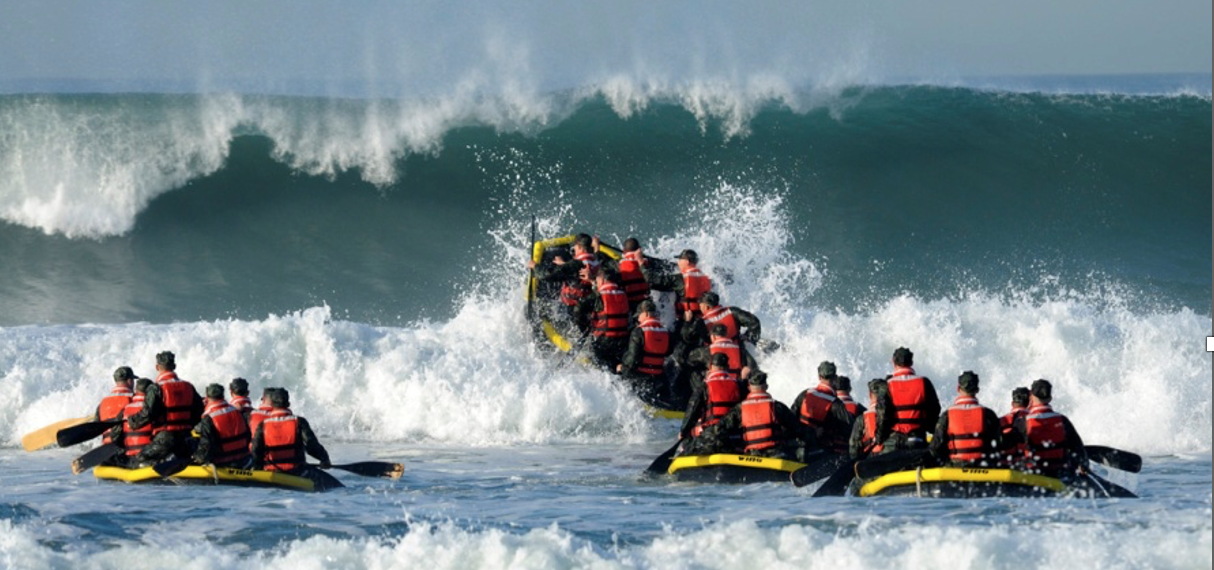Editor’s Note: This piece is from Mike, a husband, father and convert to the Catholic faith. Mike is a retired SEAL officer who spent many years at SEAL Team Six. He attends the Traditional Latin Mass.
On a Sunday night in October, 1989, Hell Week began. Gunfire, flash-bangs, yelling, confusion: all designed to induce the maximum stress and chaos among us SEAL trainees. It continued non-stop for the next 4-1/2 days. Attrition was about 70%: a typical rate.
I was a 22 year old Navy ensign leading a “boat crew” of six fellow trainees. About 48 hours into Hell Week (it was Tuesday evening), we paddled our inflatable rubber boats ashore at “Camp Surf,” not far from the border with Mexico. Camp Surf is specially designed for attrition: it is an inflection point for one’s physical and psychological endurance, both of which are at their natural limit at that point in the week.
The first event at Camp Surf was a punishing 45-minute dune run. A line of boat crews ran up and down the steep dunes carrying their heavy boats on their heads. An instructor set an inhumanly fast pace. There was wailing and gnashing of teeth, some injuries, and a couple of quitters. Finally, it was over. Everyone pulled up in a formation, gasping for breath, struggling to keep their boats over their heads.
“Guess what, boys … we’re doing it all again! Line up, follow me, let’s go!” The lead instructor moved out a few paces in front. The effect of this announcement and apparent turn of events was like a hard hammer blow. The psychological impact was pronounced. Stunned, shocked, the formation wavered. Half a dozen trainees immediately ran to ring the bell and quit. I could see the limits of my own willpower on the immediate horizon, the only time in training the thought of quitting ever entered my mind. It was that bad.
I tell this little vignette now for a reason. Among traditionalist Catholics, there has been a range of reactions to the events in Rome in 2025, similar to 2013. Some are enthusiastic; some cautiously optimistic; others anticipate a de facto Francis II, papered over with vestments and a little Latin. Time will tell what actually happens.
Catholics rightly feel that they’ve been through the equivalent of a 12-year Camp Surf dune run. Deo gratias, it’s over! But what if it isn’t? What if, after all that, we have to line up now and step off on another run through the dunes? How will you keep from breaking?
First, understand a little of the psychology of suffering and hardship. Intense training systems, as well as coercive detention and interrogation programs, use these almost universal tendencies
• The anticipation of suffering is worse than the actual thing; and
• The imagination of a future of continuous suffering, without reprieve, is psychologically devastating, and nearly irresistible.
You can see both of these tendencies at work – at least partially–in the Church leadership situation. We assume it’s going to be bad, and we jump immediately to the worst possible judgment of concrete facts. And we are well aware of our powerlessness to do anything about it except to endure. We wonder if, in fact, we personally have the power to endure.
Lessons learned from intense training and conditioning regimes, such as the SEALs, offer some insight here. These are two practices that are essential to surviving SEAL training, or any other real-world event demanding endurance of hardship. I can personally attest to these, after a career in special operations that included many combat deployments.
1. Focus on the immediate task at hand. Compartmentalize the particular, unpleasant thing. Separate it from rumors, possibilities, horror stories, or your undisciplined imagination. What is real, right here and right now, is that you’ve got numerous daily duties to perform, corresponding to your state in life. Mow the lawn; wash the dishes; pray the Office; etc.: that’s all you can control and all that God really asks you to do. If you pile on mental phantoms loaded with negative “maybe’s,” not only will you likely perform your actual duties and tasks poorly, but you’ll also pile up unnecessary weight that eventually will break you. Just do what’s put in front of you. Train yourself to do this.
2. Don’t let yourself be isolated in your fear and anxiety. Just as an enemy force seeks the isolated straggler or unit to target and eliminate, evil looks for the isolated soul to prey upon. Personal connections and teams really work. In military training, it is reliance on the team that always gets you through your own rough spots. Share your fears, seek reality through others’ (hopefully) grounded perceptions, rely on others when necessary.
This may seem like blinding-flash-of-the-obvious stuff. But I’ve seen this work in real life, very many times, to overcome fear-based paralysis and despair. If you’re suffering from Pope-xiety, these practices will help.
Finally, we must always keep in mind the sources of hope. Things may seem bad to you, and you may feel that they’ll only get worse. But remember: relief often comes in ways that are either unanticipated or unimaginable. At Camp Surf, after we remaining students had taken the first few unsteady steps to repeat the dune run — committing our wills to the task at hand– suddenly it was called off. God, who is Hope, is not a calculating puppet-master inflicting precise doses of hardship. Instead, we can be sure that through whatever means – maybe unimaginable to us – he will bring about His Holy Will.
Mike has been on the Padre Peregrino show several times, including here.
